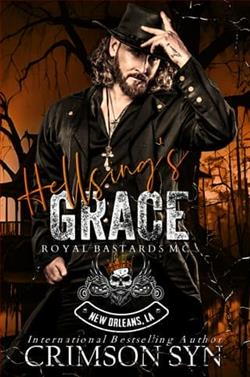Page 16 of Taming the Highland Misfits
* * *
“Oh, Finley, I am so, so sorry,” Isla said huskily. Her heart was breaking for him, since she knew how much he had loved Agnes. “What caused her death?”
“I still dinnae know,” he answered. “I didnae see her body again. I went tae the funeral, but the coffin was already closed, an’ naebody could tell me how she died. My Da had always been a drinker, but without my mother tae stop him, he drank himself to death. I found him in the street outside our house one night.”
“And you went to stay with your aunt, you say?” Isla asked. “Was she a good lady?”
“Aye,” he answered warmly. “Apart fae my Ma, Auntie Bettie was the finest woman I ever knew, but then she was Ma’s sister. Three years after I came here she died as well. Some kind o’ fever got her, an’ although she wasnae my mother I loved her an’ grieved for her. But she left me the house an’ the land it stands on as well as the chickens an’ goats an’ the pig.” He smiled at her suddenly. “Enough about me. Ye must be hungry.”
With that, he left the room and Isla was left to turn over what he had said in her mind. She was amazed that she had not heard of Agnes McGill’s death, but then her father had kept her out of village life as much as possible, not wanting her to be contaminated by the lower classes.
When Finley returned, he was carrying a steaming bowl of something that smelled absolutely delicious. “Rabbit stew,” he announced. “I hope ye like it.” He sat down on the edge of the bed, and to her surprise, he began to feed her.
It was sublime, Isla thought, as she chewed on a succulent piece of meat. The gravy was rich and brown, full of mushrooms from the fields, onions, turnips and herbs. When she had finished, Finley handed her a ripe apple and a cup of ale, then set to his own meal with gusto, while Isla watched him. It was good to see someone enjoying his food so much, she thought.
“That was delicious,” she said appreciatively, licking her lips. “Where did you learn to cook?”
“I watched Auntie Bettie for a while, but mostly I taught myself,” he answered. “It’s no’ very hard.”
“Why did you decide to feed me today?” Isla asked curiously.
“Ye looked so ill when ye woke up,” he replied. “I thought it would be better tae help ye. I’m sorry if it bothered ye.”
“No, it did not,” she replied. “You are a very kind man, Finley.”
“Thank ye.” He was blushing a little, clearly unused to so many compliments.
“What are you doing for a living now?” Isla asked.
The question took him completely by surprise, and he only just managed to stop himself from panicking. He was certainly not going to tell her what his real occupation had been all these years! He thought quickly and said: “I am a blacksmith.”
“So you finished learning the trade you started all those years ago,” Isla observed. She looked pleased for him, but after a few moments her smile faded and an expression of profound sadness crept over her face.
“I will leave tomorrow,” she said, then she forced a smile. “I am sure you need to be back at work. I hope you will not be in trouble for this.”
“I am my own boss,” he replied. “I answer tae naebody but myself.” With that, he stood up and began to tidy away the dishes they had been using.
Isla wondered where his forge was, but decided not to ask; for some reason, he was obviously not willing to give out any more information about himself, and she made up her mind not to ask any more questions.
“Would ye like me tae comb your hair?” he asked. “I used tae dae it for—” he stopped suddenly to collect himself, then went on. “She taught me how tae dae it without pullin’ her hair out.”
“That would be wonderful, thank you.” Isla ran her hands down the tangled mass.
“Maybe ye would like tae wash it as well,” he suggested. “Auntie used tae make her own soap. She taught me how tae do that too.”
Isla giggled, shaking her head in disbelief. “Is there anything you cannot do?” she asked.
“I cannae sing!” he replied, laughing heartily. “I sound like a frog wi’ a sore throat.”
“I would love to wash my hair,” Isla answered, still laughing.
“I will help ye,” Finley offered. “If ye want me tae, of course.”
“What a kind man you are,” she said warmly. “Of course I do.”
7
The last time Isla had had her hair washed was when Maura had done it the week before, and it had had plenty of opportunity to become filthy since then. She sighed blissfully as the warm water cascaded over her head, but when Finley’s strong hard fingers began to massage her scalp as he worked the soap in, she could have fainted with delight. The sensation of the firm pressure was sublime, even though it was almost, but not quite, painful. It was glorious, and it made her wonder what life would have been like if things had turned out differently and she had married Finley instead of being forced to wed the beast her father had chosen for her. She would dismiss her maid so that he could do this all the time! The thought was blissful.















